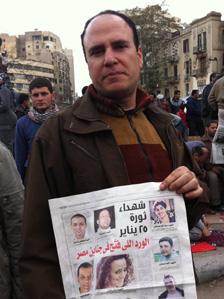Egypt protesters and journalists come under police fire
- Published
BBC's Christian Fraser in Cairo: 'Intimidation is rife'
An end to restrictive emergency laws and routine abuse by state security services were among the main demands of Egypt's first "day of rage" on 25 January.
However, since then many protesters have been detained without charge and become victims of police brutality, according to human rights groups.
Activists estimate that more than 300 people have been killed in the popular uprising and several thousand have been injured.
Funerals and memorial services have been taking place on a daily basis.
"I would love my friend, Ahmed Bassiouni, to be remembered as a brave, honest, crazy, beloved guy," says Shady Noshokaty.
"He was a brilliant musician, a contemporary artist, a teacher and a father to two kids."
The two men, both young university art professors, joined the protest after Friday prayers on 28 January but became separated.
Four days later, the body of Mr Bassiouni was found in a hospital with bullet wounds to his neck.
"I'll be honest, in the beginning I wasn't sure the demonstration would do anything, but now it's really become my cause," says Mr Noshokaty.
'Everyone is a target'
Friends of the dead man have hung up a huge picture of him outside one of the boarded-up fast-food outlets at the edge of Tahrir Square.
Signs showing others killed in the demonstrations have appeared on nearby railings, and websites have been set up to commemorate them. Most were killed at the height of violent clashes with police a week and a half ago.
After touring Cairo's hospitals, Heba Morayef of Human Rights Watch concluded: "A great number of deaths were caused by live gunshot on Friday 28 January, others were from rubber bullets and tear gas fired at too close a range.
"There were also some cases of people shot at extremely close range at one police station on the Friday night. Another category was deaths from sniper-shots, mostly outside the interior ministry on Saturday 29 January."
At least one journalist, Ahmed Mahmoud, who worked for a state-owned publication, has been killed during the demonstrations.
He was shot in the eye by a police officer on 29 January while taking photographs of the protests on his mobile phone from the balcony of his office.
"Now the situation has become very bad for journalists in Egypt," observes the dead man's colleague, Mohamed Basiouni, who wrote his obituary in the al-Ahram newspaper.
"Everyone finds himself a target."
'Dangerous work'
Many Egyptian and foreign media workers have reported being assaulted by thugs with the help of police during demonstrations.

Protesters are keen to remember those who have died for the cause
The military and state security continue to arrest journalists, activists and protesters. Many are held for less than 24 hours, but some have stayed in custody for up to two days.
"While most people are released after a short time, we do have some reports of people being beaten," says Gamal Eid of the Arab Network for Human Rights.
He says he is investigating the disappearance of several doctors, working at field clinics in Tahrir Square and the blogger, Kareem Amer, who was released in November after being imprisoned for three years.
The government has promised demonstrators it will lift the emergency law, in place since 1981, which gives wide powers to security services.
Critics have long complained that the law has created a culture of impunity and leads to systematic abuses of human rights in the name of national security.
The law is supposed to be restricted to terrorism and drugs cases. However, the experience of protest organiser Wael Ghonim, who described being dragged to a car by four men on 28 January, threatened and kept blindfolded during 12 days of detention, suggests it is still used against political dissidents.
Few young protesters in central Cairo believe they are safe from the security services despite a reported order from the president that "they should not be detained, harassed or denied their freedom of expression".
At the Hisham Mubarak Law Centre, which specialises in human rights cases - from police torture to advice for political activists - a clear-up is still going on after the offices were raided on 3 February.
Security forces temporarily detained more than 30 people after the raid, including lawyers, human rights campaigners and members of the April 6 Youth Movement. The hard drives of computers and laptops were seized.
Malik Adli, a lawyer from the centre who was picked up before his colleagues, says it is "dangerous work".
"They accuse us of being spies or being disloyal to our country."
But he says there is still determination to carry on.
"No-one can stop us. The police and army have committed many crimes against Egyptian citizens in the past few days. Now we have a lot of work."